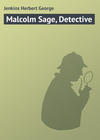Loe raamatut: «Malcolm Sage, Detective», lehekülg 8
Drawing a spring metal-rule from his pocket, he proceeded to take aseries of measurements, which he jotted down in a notebook.
He next examined the water-pipe up which the man presumably hadclimbed, and presently passed on to a similar pipe farther to theleft. Every inch of ground he subjected to a careful and elaborateexamination, lifting the lower branches of some evergreens andgazing beneath them.
Finally, closing his notebook with a snap, Malcolm Sage seatedhimself upon a garden-seat and, carefully filling and lighting hispipe, he became absorbed in the polished pinkness of the thirdfingernail of his left hand.
A quarter of an hour later he was joined by young Glanedale.
"Found anything?" he enquired.
"There are some footprints," said Malcolm Sage, looking at himkeenly. "By the way, what did you do when you heard of the robbery?"
"I went to the Mater's room."
"And after that?"
"I rushed downstairs and started looking about."
"You didn't happen to come anywhere near this spot, or walk upon themould there?" He nodded at the place he had just been examining.
"No; as a matter of fact, I avoided it. The Mater warned me to becareful."
Malcolm Sage nodded his head.
"Did the butler join you in your search?" he enquired.
"About five minutes later he did. He had to go back and put on somethings; he was rather sketchy when he turned up in the Mater'sroom." Glanedale grinned at the recollection.
"And you?" Malcolm Sage flashed on him that steel grey look ofinterrogation. For a moment the young man seemed embarrassed, and hehesitated before replying.
"As a matter of fact, I hadn't turned in," he said at length.
"I see," said Malcolm Sage, and there was something in his tone thatcaused Glanedale to look at him quickly.
"It was such a rippin' night that I sat at my bedroom windowsmoking," he explained a little nervously.
"Which is your bedroom window?"
Glanedale nodded in the direction of the farther end of the house.
"That's the governor's dressing-room," he said, indicating thewindow on the left of that through which the burglar had escaped,"and the next is mine."
"Did you see anything?" enquired Malcolm Sage, who, having unscrewedthe mouthpiece of his pipe, proceeded to clean it with a blade ofgrass.
Again there was the slightest suggestion of hesitation before
Glanedale replied.
"No, nothing. You see," he added hastily, "I was not looking out ofthe window, merely sitting at it. As a matter of fact, I was facingthe other way."
"You heard no noise?"
Glanedale shook his head.
"So that the first intimation you had of anything being wrong waswhat?" he asked.
"I heard the Mater at her door calling for assistance, and I wentimmediately."
Malcolm Sage turned and regarded the water-pipe speculatively.
"I wonder if anyone really could climb up that," he said. "I'm sure
I couldn't."
"Nothing easier," said Glanedale. "I could shin up in two ticks,"and he made a movement towards the pipe.
"No," said Malcolm Sage, putting a detaining hand upon his arm. "Ifyou want to demonstrate your agility, try the other. There are markson this I want to preserve."
"Right-o," cried Glanedale with a laugh, and a moment later he wasshinning up the further pipe with the agility of a South Seaislander after coker-nuts.
Malcolm Sage walked towards the pipe, glanced at it, and then at thefootprints beneath.
"You were quite right," he remarked casually. Then a moment later heenquired:
"Do you usually sit up late?"
"We're not exactly early birds," Glanedale replied a littleirrelevantly. "The Mater plays a lot of bridge, you know," he added.
"And that keeps you out of bed?"
"Yes and no," was the reply. "I can't afford to play with the
Mater's crowd; but I have to hang about until after they've gone.
The governor hates it. You see," he added confidentially, "when a man's had to make his money, he knows the value of it."
"True," said Malcolm Sage, but from the look in his eyes histhoughts seemed elsewhere.
"By the way, what time was it that you had a shower here lastnight?"
"A shower?" repeated Glanedale. "Oh! yes, I remember, it was justabout twelve o'clock; it only lasted about ten minutes."
"I'll think things over," said Malcolm Sage, and Glanedale, takingthe hint, strolled off towards the house.
Malcolm Sage walked over to where an old man was trimming a hedge.
"Could you lend me a trowel for half an hour?" he enquired.
"No, dang it, I can't," growled the old fellow. "I ain't a-going tolend no more trowels or anything else."
"Why?" enquired Malcolm Sage.
"There's my best trowel gone out of the tool-house," he grumbled,"and I ain't a-going to lend no others."
"How did it go?"
"How should I know?" he complained. "Walked out, I suppose, same astrowels is always doin'."
"When did you miss it?"
"It was there day 'fore yesterday I'll swear, and I ain't a-going tolend no more."
"Do you think the man who took the jewels stole it?" enquired
Malcolm Sage.
"Dang the jools," he retorted, "I want my trowel," and, grumbling tohimself, the old fellow shuffled off to the other end of the hedge.
Half an hour later Malcolm Sage was in Hyston, interviewing theinspector of police, who was incoherent with excitement. He learnedthat Scotland Yard was sending down a man that afternoon, furthermore that elaborate enquiries were being made in theneighbourhood as to any suspicious characters having recently beenseen.
Malcolm Sage asked a number of questions, to which he received moreor less impatient replies. The inspector was convinced that therobbery was the work of the same man who had got away with Mrs.Comminge's jewels, and he was impatient with anyone who did notshare this view.
From the police station Malcolm Sage went to The Painted Flag, where, having ordered lunch, he got through to the Twentieth CenturyInsurance Corporation, and made an appointment to meet one of theassessors at Home Park at three o'clock.
CHAPTER X A LESSON IN DEDUCTION
I
Mr. Grimwood, of the firm of Grimwood, Galton & Davy, insuranceassessors, looked up from the list in his hand. He was a shrewdlittle man, with side-whiskers, pince-nez that would never sitstraight upon his aquiline nose, and an impressive cough.
He glanced from Malcolm Sage to young Glanedale, then back again to
Malcolm Sage; finally he coughed.
The three men were seated in Sir Roger Glanedale's library awaitingthe coming of Lady Glanedale.
"And yet Mr. Glanedale heard nothing," remarked Mr. Grimwoodmusingly. "Strange, very strange."
"Are you in the habit of sitting smoking at your bedroom window?"enquired Malcolm Sage of Glanedale, his eyes averted.
"Er – no, not exactly," was the hesitating response.
"Can you remember when last you did such a thing?" was the nextquestion.
"I'm afraid I can't," said Glanedale, with an uneasy laugh.
"Perhaps you had seen something that puzzled you," continued MalcolmSage, his restless fingers tracing an imaginary design upon thepolished surface of the table before him.
Glanedale was silent. He fingered his moustache with a nervous hand.
Mr. Grimwood looked across at Malcolm Sage curiously.
"And you were watching in the hope of seeing something more,"continued Malcolm Sage.
"I – " began Glanedale, starting violently, then he stopped.
"Don't you think you had better tell us exactly what it was yousaw," said Malcolm Sage, raising a pair of gold-rimmed eyes thatmercilessly beat down the uneasy gaze of the young man.
"I – I didn't say I saw anything."
"It is for you to decide, Mr. Glanedale," said Malcolm Sage, withan almost imperceptible shrug of his shoulders, "whether it isbetter to tell your story now, or under cross-examination in thewitness-box. There you will be under oath, and the proceedings willbe public."
At that moment Lady Glanedale entered, and the three men rose.
"I am sorry to interrupt you," she said coldly, "but Sir Roger hasjust telephoned and wishes to speak to Mr. Glanedale."
"I fear we shall have to keep Sir Roger waiting," said Malcolm Sage, walking over to the door and closing it.
Lady Glanedale looked at him in surprise.
"I do not understand," she began.
"You will immediately," said Malcolm Sage quietly. "We were justdiscussing the robbery." He slightly stressed the word "robbery."
"Really – " began Lady Glanedale.
"Mr. Glanedale was sitting at his window smoking," continued MalcolmSage evenly. "He cannot remember ever having done such a thingbefore. I suggested that something unusual had attracted hisattention, and that he was waiting to see what would follow. I wasjust about to tell him what had attracted his attention when youentered, Lady Glanedale."
Glanedale looked across at his step-mother and then at Malcolm Sage.
His misery was obvious.
"Last night, soon after twelve," continued Malcolm Sage, "Mr.Glanedale happened to look out of his window and was surprised tosee a figure moving along towards the left. It was not the figure ofa man with a handkerchief tied across his face as a mask; but awoman. He watched. He saw it pause beneath the second window of yourbedroom, Lady Glanedale, not the one by which the burglar entered.Then it stooped down."
Malcolm Sage's fingers seemed to be tracing each movement of themysterious figure upon the surface of the table. Lady Glanedalegazed at his long, shapely hands as if hypnotised.
"Presently," he continued, "it returned to the first window, whereit was occupied for some minutes. Mr. Glanedale could not see this; but the figure was engaged in making footprints and marking thesides of the water-pipe with a shoe or boot as high up as it couldreach. It – "
"How dare you make such an accusation!" cried Lady Glanedale, makingan effort to rise; but she sank back again in her chair, her faceplaster-white.
"I have made no accusation," said Malcolm Sage quietly. "I amtelling what Mr. Glanedale saw."
A hunted look sprang to Lady Glanedale's eyes. She tore her eyesfrom those magnetic fingers and gazed about her wildly as ifmeditating flight. Her throat seemed as if made of leather.
"Would you be prepared to deny all this in the witness-box underoath, Mr. Glanedale?" enquired Malcolm Sage.
Glanedale looked at him with unseeing eyes, then across at hisstep-mother.
"The woman had put on a pair of men's boots that the footprintsmight be masculine. They were so much too large for her that she hadto drag her feet along the ground. The boots were those of a manweighing, say, about eleven and a half stone; the weight insidethose boots shown by the impression in the mould was little morethan seven stone."
Lady Glanedale put out her hand as if to ward off a blow; but
Malcolm Sage continued mercilessly, addressing Glanedale.
"The length of a man's stride is thirty inches; between these stepsthe space was less than fifteen inches. Skirts are worn verynarrow."
He paused, then, as Lady Glanedale made no reply, he turned to
Glanedale.
"I asked you this morning," he said, "to climb the other pipe forthe double purpose of examining the impress of your boots on themould as you left the ground and when you dropped back again on tothe mould. Also to see what sort of marks a pair of leather bootswould make upon the weatherworn paint of the pipe.
"As you sprang from the ground and clutched the pipe, there was adeep impress on the mould of the soles of both boots, deep at thetoes and tapering off towards the heel. On your return you madedistinct heel-marks as well."
Lady Glanedale had buried her face in her hands. She must blot outthe sight of those terrible hands! Glanedale sat with his eyes uponMalcolm Sage as if hypnotised.
"There was a shower of rain last night about twelve, an hour beforethe alleged burglar arrived; yet the footprints were made before therain fell. In two cases leaves had been trodden into the footprints; yet on these leaves were drops of rain just as they had fallen."
The hands seemed to draw the leaves and indicate the spots of wateras if they had been blood. Glanedale shuddered involuntarily.
"In the centre-part of the pipe there were no marks, although therewere light scratches for as high up as the arm of a short personcould reach, and as far down from the bedroom window as a similararm could stretch. These scratches were quite dissimilar from thosemade on the other pipe."
Lady Glanedale moaned something unintelligible.
"Although there had been a shower and the mould was wet," proceededMalcolm Sage, "there were no marks of mud or mould on the pipe, onthe window-sill, or in Lady Glanedale's bedroom, which, I understand, had purposely not been swept. A man had slid down that water-pipe; yet he had done so without so much as removing the surface dust fromthe paint.
"He had reached the ground as lightly as a fairy, without making anymark upon the mould; the footprints were merely those of someoneapproaching and walking from the pipe."
Glanedale drew a cigarette case from his pocket; opened it, took outa cigarette, then, hesitating a moment, replaced it, and returnedthe case to his pocket, his eyes all the time on Malcolm Sage.
"I think," continued Malcolm Sage, "we shall find that the burglarhas buried the jewel-case a few yards to the right of the pipe he issupposed to have climbed." His forefinger touched a spot on theextreme right of the table. "There are indications that the mouldhas been disturbed. Incidentally a trowel is missing – "
Glanedale suddenly sprang to his feet, just as Lady Glanedale fellforward in her chair – she had fainted.
II
"It's a very unpleasant business," remarked Mr. Goodge, the GeneralManager of the Twentieth Century Insurance Company, as he looked upfrom reading a paper that Malcolm Sage had just handed to him. In itLady Glanedale confessed the fraud she had sought to practise uponthe Corporation. "A very unpleasant business," he repeated.
Malcolm Sage gazed down at his finger-nails, as if the matter had nofurther interest for him. When his brain was inactive, his handswere at rest.
"I don't know what view the Board will take," continued Mr. Goodge,as Malcolm Sage made no comment.
"They will probably present me with another walking-stick," heremarked indifferently.
Mr. Goodge laughed. Malcolm Sage's walking-stick had been a standingjoke between them.
"What made you first suspect Lady Glanedale?" he enquired.
"She had omitted to rehearse the episode of the burglary, andconsequently when it came to reconstructing the incident, she failedin a very important particular." Malcolm Sage paused.
"What was that?" enquired Mr. Goodge with interest, as he pushed abox of cigars towards Malcolm Sage, who, however, shaking his head, proceeded to fill his pipe.
"She had already told me that the key of the safe was always keptbeneath a pile of handkerchiefs in one of the drawers of herdressing-table; yet when I asked her to go through exactly the samemovements and actions as when the burglar entered her room, she rosedirect from the bed and went to the safe. The dressing-table was atthe other end of the room, and to get to it she would have had topass the spot where she said the man was standing."
Mr. Goodge nodded his head appreciatively.
"The next point was that I discovered it was Lady Glanedale whosuggested to the police inspector that means should be taken toprevent anyone approaching the water-pipe by which the man wassupposed to have climbed. She was anxious that the footprints shouldbe preserved.
"Another point was that young Glanedale happened to remark that hisstep-mother was much addicted to bridge, and that the stakes weretoo high to admit of his joining in. Also that men who havethemselves accumulated their wealth know the value of money. SirRoger disliked bridge and probably kept his lady short."
"Most likely," agreed Mr. Goodge. "He has the reputation of being abit shrewd in money matters. When did you begin to suspect LadyGlanedale?"
"From the first," was the reply. "Everything rang false. LadyGlanedale's story suggested that it had been rehearsed until she hadit by heart," continued Malcolm Sage. "It was too straightforward, too clearly expressed for the story of a woman who had just losteight thousand pounds' worth of jewels. When I put questions to hershe hesitated before replying, as if mentally comparing her intendedanswer with what she had already told.
"Then she was so practical in preparing a list of the lost jewels atonce, and in warning her stepson not to go near the spot beneath herwindow, as there might be footprints; this at a time when she wassupposed to be in a state of great excitement."
"Did you suspect young Glanedale at all?" queried Mr. Grimwood.
"No," said Malcolm Sage, "but to make quite sure I cast doubt uponthe possibility of anyone climbing the pipe. If he had beenconcerned he would not have volunteered to prove I was wrong."
"True," said Mr. Goodge as he examined critically the glowing end ofhis cigar. "Lady Glanedale seems to have done the job very clumsily, now that you have explained everything."
"Even the professional criminal frequently underrates theintelligence of those whose business it is to frustrate him; butLady Glanedale's efforts in marking the water-pipe would not havedeceived a child. A powerful magnifying-glass will show that on allsuch exterior pipes there is an accumulation of dust, which would beremoved from a large portion of the surface by anyone climbingeither up or down. Lady Glanedale had thought marks made by a bootor a shoe would be sufficient confirmation of her story. She israther a stupid woman," he added, as he rose to go.
"I suppose she got the idea from the Comminge affair?"
"Undoubtedly," was the response; "but as I say, she is a stupidwoman. Vanity in crime is fatal; it leads the criminal to underratethe intelligence of others. Lady Glanedale is intensely vain."
"The Board will probably want to thank you personally," said Mr.Goodge as he shook hands; "but I'll try and prevent them from givingyou another walking-stick," he laughed as he opened the door.
CHAPTER XI THE MCMURRAY MYSTERY
I
Of the many problems upon which Malcolm Sage was engaged during theearly days of the Malcolm Sage Bureau, that concerning the death ofProfessor James McMurray, the eminent physiologist, was perhaps themost extraordinary. It was possessed of several remarkable features; for one thing the murderer had disappeared, leaving no clue; foranother the body when found seemed to have undergone a strangechange, many of the professor's sixty-five years appearing to havedropped from him in death as leaves from an autumn tree.
It was one of those strange crimes for which there is no apparentexplanation, consequently the strongest weapon the investigator has, that of motive, was absent. As far as could be gathered the deadprofessor had not an enemy in the world. He was a semi-recluse, withnothing about him to tempt the burglar; yet he had been brutallydone to death in his own laboratory, and the murderer had made goodhis escape without leaving anything likely to prove helpful to thepolice.
One day as Gladys Norman, like "panting Time," toiled after her workin vain, striving to tap herself up to date with an accumulation ofcorrespondence, the telephone-bell rang for what seemed to her theumpteenth time that morning. She seized the receiver as a dog seizesa rat, listened, murmured a few words in reply, then banged it backupon its rest.
"Oh dear!" she sighed. "I wish they'd let him alone. The poor dearlooks tired out." She turned to William Johnson, who had justentered. "Why don't you hurry up and become a man, Innocent," shedemanded, "so that you can help the Chief?"
William Johnson looked vague and shuffled his feet. His admirationof Malcolm Sage's secretary rendered him self-conscious in herpresence.
"Sir John Dene and Sir Jasper Chambers to see the Chief," heannounced, obviously impressed by the social importance of thecallers.
"Sure it's not the Shah of Persia and Charlie Chaplin?" she askedwearily as she rose from her table and, walking over to the doormarked "Private," passed into Malcolm Sage's room.
Reappearing a moment later she instructed William Johnson to showthe visitors in at once.
As the two men passed through Miss Norman's room, they formed astriking contrast, Sir John Dene short, thick-set, alert, with thestamp of the West-End upon all he wore; Sir Jasper Chambers tall, gaunt arid dingy, with a forehead like the bulging eaves of anElizabethan house, and the lower portion of his face a riot of shortgrizzled grey hair that seemed to know neither coercion norrestraint. His neck appeared intent on thrusting itself as far aspossible out of the shabby frock-coat that hung despairingly fromhis narrow shoulders.
"I wonder," murmured Gladys Norman, as she returned to her typing,"how many geraniums he had to give for those clothes."
"Morning, Mr. Sage," cried Sir John Dene.
Malcolm Sage rose. There was an unwonted cordiality in the way inwhich he extended his hand.
"This is Sir Jasper Chambers." Sir John Dene turned to his companion."You'll be able to place him," and he twirled the unlit cherootbetween his lips with bewildering rapidity.
Sir Jasper bowed with an old-world courtliness and grace that seemedstrangely out of keeping with his lank and unpicturesque bearing.Malcolm Sage, however, held out his hand with the air of one wishingto convey that a friend of Sir John Dene merited specialconsideration.
He motioned the two men to seats and resumed his own. Both declinedthe box of cigars he proffered, Sir John Dene preferring thewell-chewed cheroot between his lips, whilst Sir Jasper drew a pipefrom the tail-pocket of his frock-coat, which with long fleshlessfingers he proceeded to fill from a chamois-leather tobacco-pouch.
"I've brought Sir Jasper along," said Sir John Dene. "You've heardabout the murder of his friend Professor McMurray. He didn't want tocome; but I told him you'd be tickled to death, and that you'd getit all figured out for him in two wags of a chipmunk's tail."
Malcolm Sage looked across at the eminent philanthropist, whosewhole attention seemed absorbed in the filling of his well-wornbriar.
Sir Jasper's wise charities and great humanitarianism wereworld-famous. It was Will Blink, the Labour demagogue, who had saidthat of all the honours conferred during the century, Sir JasperChambers' O.M. had alone been earned, the others had been eitherbought or wangled.
The McMurray Murder was the sensation of the hour. The newspapershad "stunted" it, and the public, always eager for gruesomesensation, had welcomed it as if it had been a Mary Pickford film.
Four days previously, Professor James McMurray of Gorling, in Essex, had been found dead in his laboratory, his head fearfully batteredin by some blunt instrument.
It was the professor's custom, when engaged upon important researchwork, to retire, sometimes for days at a time, to a laboratory hehad built in his own grounds.
Meals were passed through a small wicket, specially constructed forthat purpose in the laboratory wall, and the professor's servantshad the most explicit instructions on no account to disturb him.
A fortnight previously Professor McMurray had retired to hislaboratory to carry out an important series of experiments. Heinformed his butler that Sir Jasper Chambers, his life-long friend, would visit him on the third day, and that dinner for two was to besupplied in the usual way, through the wicket.
On the evening in question, Sir Jasper Chambers had arrived andstayed until a little past nine. He then left the laboratory andproceeded to the house, where he told the butler that his master wasquite well, and that in all probability his researches would occupyhim another week.
Eight days later, when the butler took the professor's luncheon downto the laboratory, he noticed that the breakfast-tray had not beenremoved from the shelf just inside the wicket. Convinced that theprofessor had been so absorbed in his researches that he hadforgotten the meal, the butler placed the luncheon-tray beside thatcontaining the breakfast, thinking it better to leave the earliermeal as a reminder to the professor of his forgetfulness.
At dinner-time the butler was greatly surprised to find that bothbreakfast and luncheon had remained as he had left them; still, remembering how definite and insistent the professor had been thathe was not to be disturbed, the butler had, after consulting withthe housekeeper, decided to do nothing for the moment, and contentedhimself with ringing several times the electric-bell that was thesignal of another meal.
An hour later he went once more to the wicket, only to discover thatnothing had been touched. Hurrying back to the house with all speedhe had conferred with Mrs. Graham, the housekeeper, and, on herinsistence, he had telephoned to the police.
Sergeant Crudden of the Essex County Constabulary immediatelybicycled over to "The Hollows," Professor McMurray's residence, and, after hearing the butler's story, he had decided to force the door; there are no windows, the laboratory being lighted from above, inorder to secure entire privacy.
To the officer's surprise the door yielded readily, havingapparently been previously forced. Entering the laboratory he washorrified to discover the body of the professor lying in the centreof the floor, his head literally smashed by a terrible blow that hadobviously been delivered from behind.
Acting on the instructions of the police-sergeant, the butler hadtelephoned the news to the police-station at Strinton, with theresult that shortly afterwards Inspector Brewitt arrived with adoctor.
The police had made no statement; but there were some extraordinaryrumours current in the neighbourhood. One was to the effect that itwas not Professor McMurray's body that had been discovered; but thatof a much younger man who bore a striking resemblance to him.
"You have seen the accounts of my friend's terrible end?" enquiredSir Jasper, as he took the box of matches Malcolm Sage handed himand proceeded to light his pipe.
Malcolm Sage nodded. His gaze was fixed upon Sir Jasper's greyworsted socks, which concertinaed up his legs above a pair ofstrangely-fashioned black shoes.
"He was about to enter upon a series of experiments with a serum hehad discovered, his object being to lengthen human life."
Sir Jasper spoke in a gentle, well-modulated voice, in which was adeep note of sadness. He and Professor McMurray had been life-longfriends, their intimacy appearing to become strengthened by thepassage of years.
"You were the last to see him alive, I understand." Malcolm Sagepicked up his fountain-pen and began an elaborate stipple design ofa serpent upon the blotting-pad.
"Eight days before he was found I dined with him," said Sir Jasper, his voice a little unsteady.
"What happened?" Malcolm Sage enquired without looking up.
"I arrived at seven o'clock," continued Sir Jasper. "From then untilhalf-past we talked upon things of general interest, after which wedined. Later he told me he was about to enter upon a final series ofexperiments, the result of which would, in all probability, eitherbe fatal to himself, or mean the lengthening of human life."
He paused, gazing straight in front of him, ejecting smoke from hislips in staccatoed puffs. Then he continued:
"He said that he had recently made a will, which was lying with hissolicitor, and he gave me certain additional instructions as to thedisposal of his property."
"Did he seem quite normal?" enquired Malcolm Sage, adding a pair offormidable fangs to his reptile.
"He was calm and confident. At parting he told me I should be thefirst to know the result."
"Have you any reason to believe that Professor McMurray hadenemies?" Malcolm Sage enquired.
"None," was the reply, uttered in a tone of deep conviction, accompanied by a deliberate wagging of the head.
"He was confident of the success of his experiments?"
"Absolutely."
"And you?"
"I had no means of knowing," was the reply.
"You were his greatest friend and his only confidant?" suggested
Malcolm Sage, adding the sixth pair of legs to his creation.
"Yes."
"And you were to be the first to be told of the result of theexperiments?"
"Those were his last words to me."
There was a suggestion of emotion in Sir Jasper's otherwise evenvoice.
"Can you remember his actual words?"
"Yes; I remember them," he replied sadly. "As we shook hands he said,
'Well, Chambers, you will be the first to know the result.'"
Again there was silence, broken at length by Malcolm Sage, whostroked the back of his head with his left hand. His eyes hadreturned to Sir Jasper's socks.
"Do you think the professor had been successful in his experiments?"he enquired.
"I cannot say." Again Sir Jasper shook his head slowly anddeliberately.
"Did you see the body?"
"I did."
"Is there any truth in the rumours that he looked much younger?"
"There was certainly a marked change, a startling change," was thereply.
"But death plays odd tricks with years," suggested Malcolm Sage, whowas now feeling the lobe of his left ear as if to assure himself ofits presence.
"True," said Sir Jasper, nodding his head as if pondering the matterdeeply. "True."
"There was an article in last month's The Present Century by SirKelper Jevons entitled 'The Dangers of Longevity.' Did you read it?"enquired Malcolm Sage.
"I did."
"I read it too," broke in Sir John Dene, who had hitherto remainedan interested listener, as he sat twirling round between his lipsthe still unlit cheroot. "A pretty dangerous business it seems to me, this monkeying about with people's glands."
"It called attention to the danger of any interference with Nature'scarefully-adjusted balances between life and death," continuedMalcolm Sage, who had returned to the serpent which now sported apair of horns, "and was insistent that the lengthening of human lifecould result only in harm to the community. Do you happen to know ifProfessor McMurray had seen this?"
"He had." Sir Jasper leaned forward to knock the ashes from his pipeinto the copper tray on Malcolm Sage's table. "We talked of itduring dinner that evening. His contention was that science couldnot be constricted by utilitarianism, and that Nature would adjusther balances to the new conditions."
















